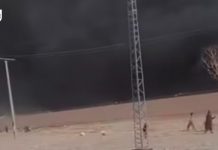In the coastal city of Gwadar on Wednesday, scores of women and children – all of them residents of the city’s Gazrawan ward – got out of their cracked homes and gathered on the road to protest against the heavy machinery that is being used in construction of the neighboring expressway. They said that when these ginormous machines are operated, they send vibrations through the land into the neighbouring settlement, where these people live. They complained that these vibrations are causing the walls, roof and floors of their houses to crack.
Gazrawan ward falls in the Gwadar Central union council, one of city’s five union councils, along with a few other wards such as Sohrabi, Komagri and Mohalla Zahoor Shah. These wards are located in the vicinity of the Gwadar Expressway – one of the main arteries of the China-Pakistan Economic Corridor that intends to provide a direct connection between the Gwadar port and the rest of Pakistan.
The Gwadar Expressway is not fully operational, and construction work is underway in several areas. The residents of the nearby Gazrawan ward complain that the heavy machinery being used in the construction is having a direct effect on their houses. They say that the machines send vibrational waves through the land that is causing their houses to crack and crumble.
Scores of women and children gathered on the Expressway in protest, blocking the highway. They demanded that the authorities must repair the damaged sewerage system and compensate for their battered houses.
Assistant Commissioner Gwadar Athar Abbasi, accompanied by Gwadar port officials, reached the protest site to negotiate with the protestors. According to reports, they assured the protestors that their demands will be met – the reconstruction and repairing work will begin in the next 15 days. The residents will be compensated for the house damage.
The protestors opened the Expressway after the assurance and suspended traffic was once again resumed.
It should be noted that the deputy commissioner of Gwadar visited the Gazrawan ward in the past. He also made similar assurances in the past, but the promises were never put in effect.




























